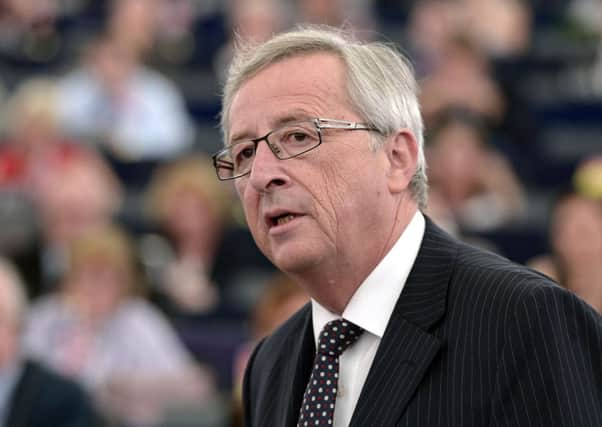Row as Juncker bars any new EU members for 5 years


He said the 28-member group needed “a break from enlargement so that we can consolidate what has been achieved”.
There would be close relations with the Balkans, Moldova and Ukraine, but there would be a halt on expansion. Croatia was the most recent country to join, 12 months ago.
Advertisement
Hide AdAdvertisement
Hide AdThe European Commission leader said: “Under my presidency of the commission, ongoing negotiations will continue … but no further enlargement will take place over the next five years.”
In Scotland the announcement sparked a major row over the possible impact in the event of a Yes vote in September’s referendum.
The pro-Union Better Together group claimed that the ban was a “hammer blow” for the campaign to leave the UK. But the Yes Scotland group said the remarks did not refer to Scotland and would only affect current candidate states which are attempting to shift their laws and regulations to match the EU’s – with Scotland’s already “100 per cent EU compliant”.
Last night, there were reports that Mr Juncker’s spokeswoman confirmed the new president was not in fact referring to Scotland.
BBC Scotland journalist James Cook quoted her as saying in a tweet: “At no point is Scotland mentioned, as this is an entirely separate issue.” She added that the Luxembourg politician “has made his position on this clear on many an occasion … an internal matter … he will respect the result.”
The EC could not be reached to confirm the statement.
Last night, Deputy First Minister Nicola Sturgeon called on the No campaign to withdraw their claims and apologise, saying: “The No campaign are guilty of distorting remarks by the newly elected president of the European Commission, which is an extremely serious matter. They must withdraw their bogus assertions as a matter of urgency and issue a public apology.”
First Minister Alex Salmond also declared the appointment of arch Euro-sceptic Philip Hammond as Foreign Secretary means the greatest threat to Scotland’s EU membership is from the UK. An “in-out” referendum is earmarked for 2017 by the Tories.
Advertisement
Hide AdAdvertisement
Hide AdThe SNP has insisted that Scotland is already in the EU – as part of the UK – and would only have to renegotiate its membership terms as a new state. This could be achieved by March 2016, the SNP states, the date earmarked for Scottish independence after Yes vote.
But senior Brussels figures, including Mr Juncker’s predecessor Jose Manuel Barrosso, have insisted that Scotland would find itself outside the EU and have to re-apply to join.
The EU issue is crucial because Scotland’s participation in the World Trade Organisation and a series of other international agreements would have to be renegotiated if it was forced to exit the EU or remain outside for a long period. It would have a major impact on jobs and economic growth.
Professor Michael Keating of the Scottish Centre on Constitutional Change said Mr Juncker’s comments were unlikely to have been directed at Scotland.
But shadow foreign secretary Douglas Alexander said it was a “hammer blow” for the SNP.
Analysis
Daniel Kenealy: ‘Many EU states suffer enlargement fatigue’
Three key questions need to be asked about the new EU president’s enlargement freeze.
First, why has Jean Claude Juncker announced this? The recent European election saw a substantial, populist, backlash against the European project. Immigration and the free movement of EU citizens are closely bound up with that.
Most of the potential candidates for EU membership are either relatively poor (Albania, Montenegro, FYR of Macedonia, Serbia) or politically controversial (Turkey). Potential membership by any would be a lightning rod. There is also a general sense of enlargement fatigue amongst many EU states.
Advertisement
Hide AdAdvertisement
Hide AdSecond, is Juncker’s announcement sensible? The prospect of membership is widely considered to be the EU’s most effective foreign policy tool. It can transform national economies and political systems through the promise of access in exchange for implementing reform. By making membership a more distant prospect, Juncker runs the risk of further deceleration of reforms in the candidate countries.
Third, does the announce-ment represent a “game changing” moment in the long-running Scotland-EU debate? In a word – no. The arguments here have not changed. The central concern of EU member states, in the event of a ‘Yes’ vote, will likely be to ensure that no gap emerges in a highly integrated single market. No game-changer here for Better Together I’m afraid.
It’s probably time to leave the issue alone as no further clarity can be brought to it before 18 September.
• Dr Daniel Kenealy is a lecturer and deputy director of the University of Edinburgh’s Academy of Government
SEE ALSO